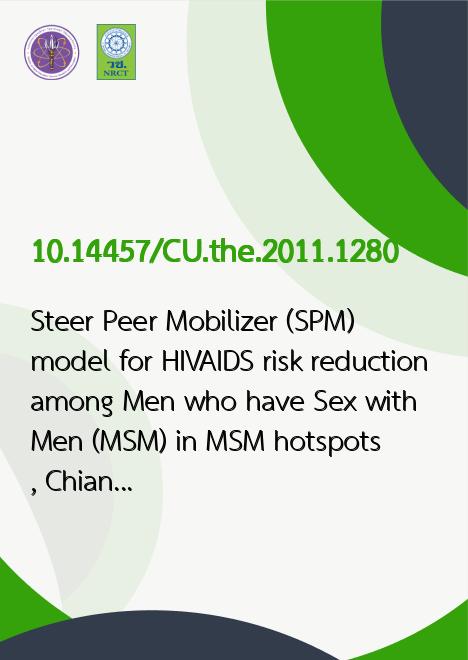
|
Steer Peer Mobilizer (SPM) model for HIV/AIDS risk reduction among Men who have Sex with Men (MSM) in MSM hotspots, Chiang Mai province |
|---|---|
| รหัสดีโอไอ | |
| Title | Steer Peer Mobilizer (SPM) model for HIV/AIDS risk reduction among Men who have Sex with Men (MSM) in MSM hotspots, Chiang Mai province |
| Creator | Kornkanok Muangpratade |
| Contributor | Ratana Somrongthong, Surasing Wisrutaratna |
| Publisher | Chulalongkorn University |
| Publication Year | 2554 |
| Keyword | Male homosexuality -- Thailand -- Chiang Mai, Sexually transmitted diseases |
| Abstract | This study aimed to establish a key MSM well-liked persons who were taught to endorse actively and visibly the importance and acceptability of behavioral change, as well as to convey strategies for change implementation, and produce reductions in MSM population who engaged in high-risk activities especially produce concomitant and population-wide increases in HIV/AIDS prevention’s concern, they are called as “Steer Peer Mobilizer (SPM).The study using a Participatory Action Research approach was conducted. The research involved 9 steps: 1) Established a partnership with stakeholders, 2) Organize a meeting with partner organizations, 3) Baseline survey, 4) Selection of MSM hot spots, 5) Identification of Steer Peer Mobilizer (SPM), 6) Formulation of Learning Process, 7) Conducting a training of SPM, 8) Implementation of SPM and 9) Evaluation of Learning Process and Outcome of Capacity Development. In the model implementation process, 20 trained SPMs were assigned to convey message and having conversations with their 3 identified peers focused on the utilization of behavioral change strategies. Pre-test and post test intervention scores of HIV/AIDS knowledge and attitude and sexuality as well as HIV infection risk behavior of the study group were compared to reveal the level of changes affected by the intervention. The primary outcome was the differences of HIV/AIDS knowledge and attitude and sexuality perception at 3 months after intervention completed. The secondary outcomes were the reduction of HIV risk behavior at 3 months after intervention completed.The result showed that HIV/AIDS knowledge and attitude and sexuality perception of the study group were significantly higher when compared between pre-intervention test and the post-test. The mean scores of HIV/AIDS knowledge and attitude and sexuality perception after intervention were higher than those before intervention (P<0.001). Also those of them after intervention were higher reduced in HIV risk behavior (P<0.001).The factors that effect on the acceptance of SPM model were training program contents and facilitation techniques used by the research team. Increasing of HIV/AIDS knowledge, awareness, and concern as well as reduction in HIV risk behavior were positively effect on the success of HIV/AIDS prevention pram for MSM group. Conclusion: Steer Peer Mobilizer (SPM) model with the focus of participatory action process significantly brought in a reduction of HIV risk behavior among MSM in Chiang Mai. This development model is documented as an innovative approach consistent to Thai context. |
| URL Website | cuir.car.chula.ac.th |